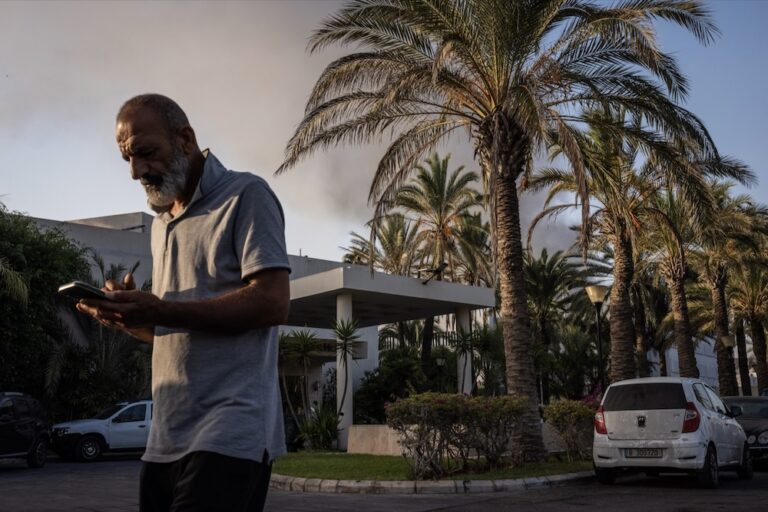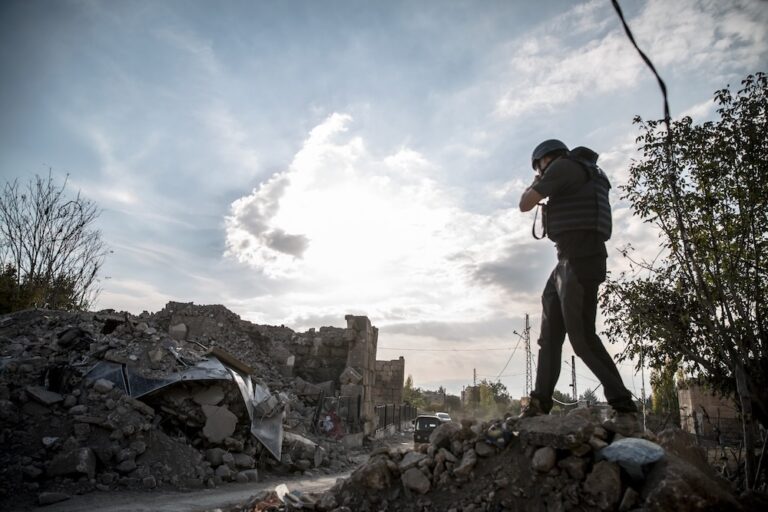(RSF/IFEX) – In a letter to President Emile Lahoud, RSF protested the arrests of journalists Antoine Bassil and Habib Younis and expressed its profound concern about the charges weighing against them. “These arrests were carried out illegally. Freedom of expression is increasingly threatened in Lebanon today. There is a clear determination on the part of […]
(RSF/IFEX) – In a letter to President Emile Lahoud, RSF protested the arrests of journalists Antoine Bassil and Habib Younis and expressed its profound concern about the charges weighing against them. “These arrests were carried out illegally. Freedom of expression is increasingly threatened in Lebanon today. There is a clear determination on the part of the intelligence services to muzzle the media,” said Robert Ménard, the organisation’s secretary-general. Moreover, RSF recalled that on 9 August 2001, a Council of Ministers press release included remarks that threaten media pluralism in Lebanon (see IFEX alert of 13 August 2001).
According to information collected by RSF, on 16 August, three men from the army’s intelligence services arrested Bassil, a correspondent from the Saudi Arabian television station MBC, at his home in Ballouné (north-east of Beirut). The Military Tribunal is prosecuting the journalist for “contact with the enemy, entry into enemy territory, forming an association in order to sabotage the state’s authority and damaging relations with a brother country” and “transmission of information to the enemy.” The journalist could face the death penalty if he is found guilty.
On 19 August, Younis, a senior editor at the daily “Al Hayat”, was arrested at his home in Jbeil (north of Beirut) by intelligence services agents. The director of military intelligence, Raymond Azar, informed Melhem Karam, president of the journalists’ union, that Younis’ arrest came “before he went to a planned Sunday meeting in Cyprus with [Odid] Zaray,” an Israeli official. “Al Hayath” stated that the journalist could not have gone to Cyprus since he was scheduled to be on duty at the newspaper’s office that day. The daily added that it was informed that Younis’ name had been “mentioned during interrogation of Antoine Bassil,” who allegedly stated that he had arranged a meeting for the journalist with Zaray. The two arrests were carried out without arrest warrants and the journalists were interrogated without lawyers present. These events have taken place in the context of a series of raids by the army’s intelligence services against anti-Syrian Christian militias since early August.
Moreover, on 9 August, two journalists were assaulted and a third journalist was arrested in front of the law courts in Beirut. They were covering a demonstration against a wave of arrests of activists and sympathisers of the Free National Current (Courant patriotique libre, CPL) and the Lebanese Forces (Forces libanaises) on 5 and 7 August in Beirut. Hussein el Moulla, an Associated Press agency photographer, was beaten by an intelligence services agent in civilian clothes who was mingling with the crowd of demonstrators, just as he was taking a picture of him. Sami Ayad, a photographer from the daily “An Nahar”, was photographing demonstrators who were roughed up by intelligence services agents when unidentified persons demanded that he hand over his film. He refused and was beaten by them until he managed to take flight. Yehia Houjairi, a cameraman from the official Kuwaiti television station, was arrested by police officers as he was filming the demonstration. The president of the photographers’ union had to intervene in order to secure his release a short time later.
That same day, following the Council of Ministers’ meeting, Minister of Information Ghazi Aridi read a statement and said he was “responsible for putting the clauses of the media law into effect,” in order to stop the “mistakes by media outlets which threaten state security.” The previous evening, the National Audio-visual Council (Conseil national de l’audiovisuel, CNA) sent a document to the Council of Ministers concerning audio-visual media outlets’ coverage of 7 and 8 August events. The report specified that the MTV television station (reputed to be close to General Aoun) “did not respect the pluralistic character of the information…, incited the concern of viewers by provoking fear that there would be a change in the nature of Lebanon’s democratic regime…[and] openly defied the political and security institutions, thereby threatening public order.”


